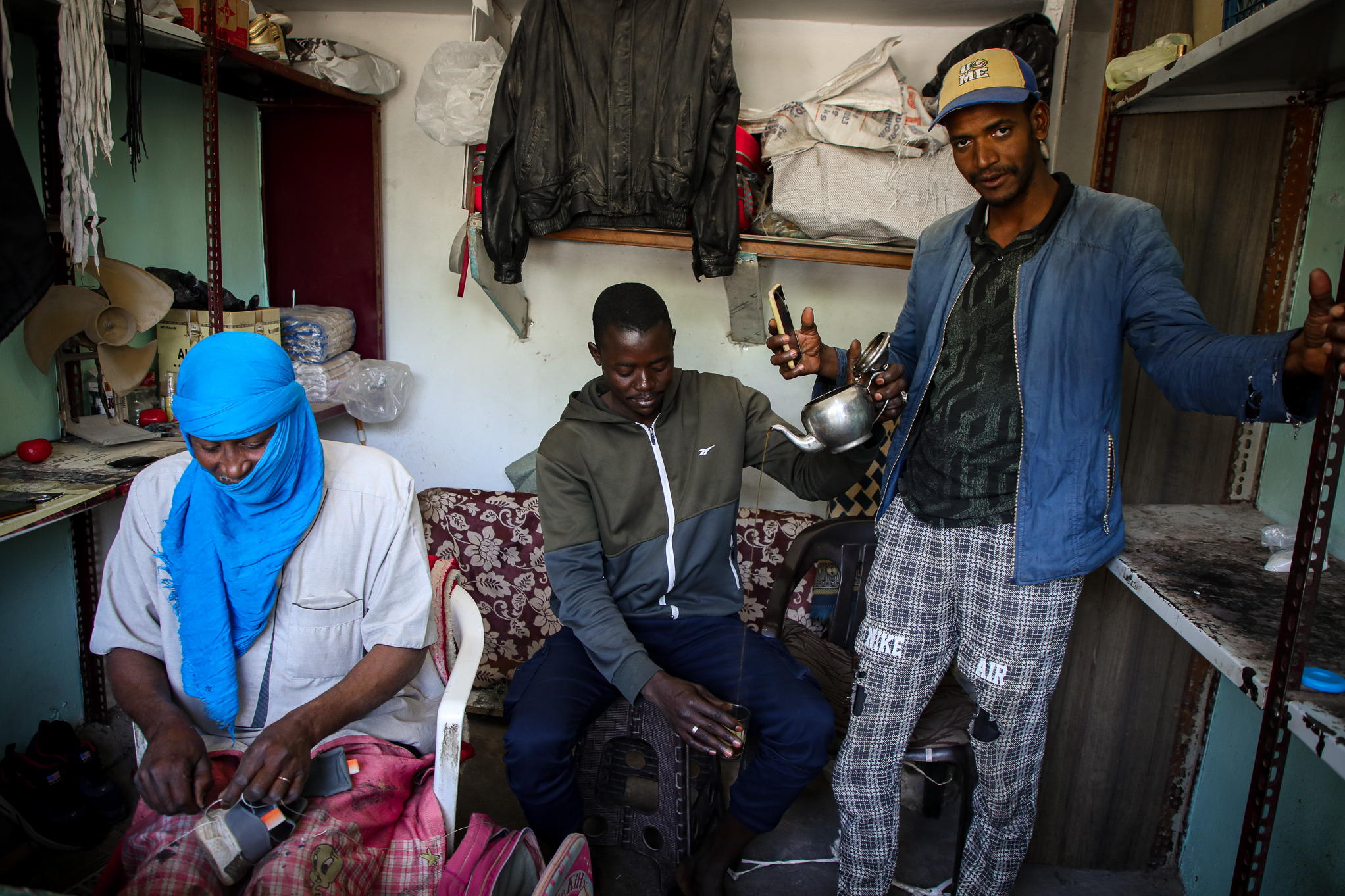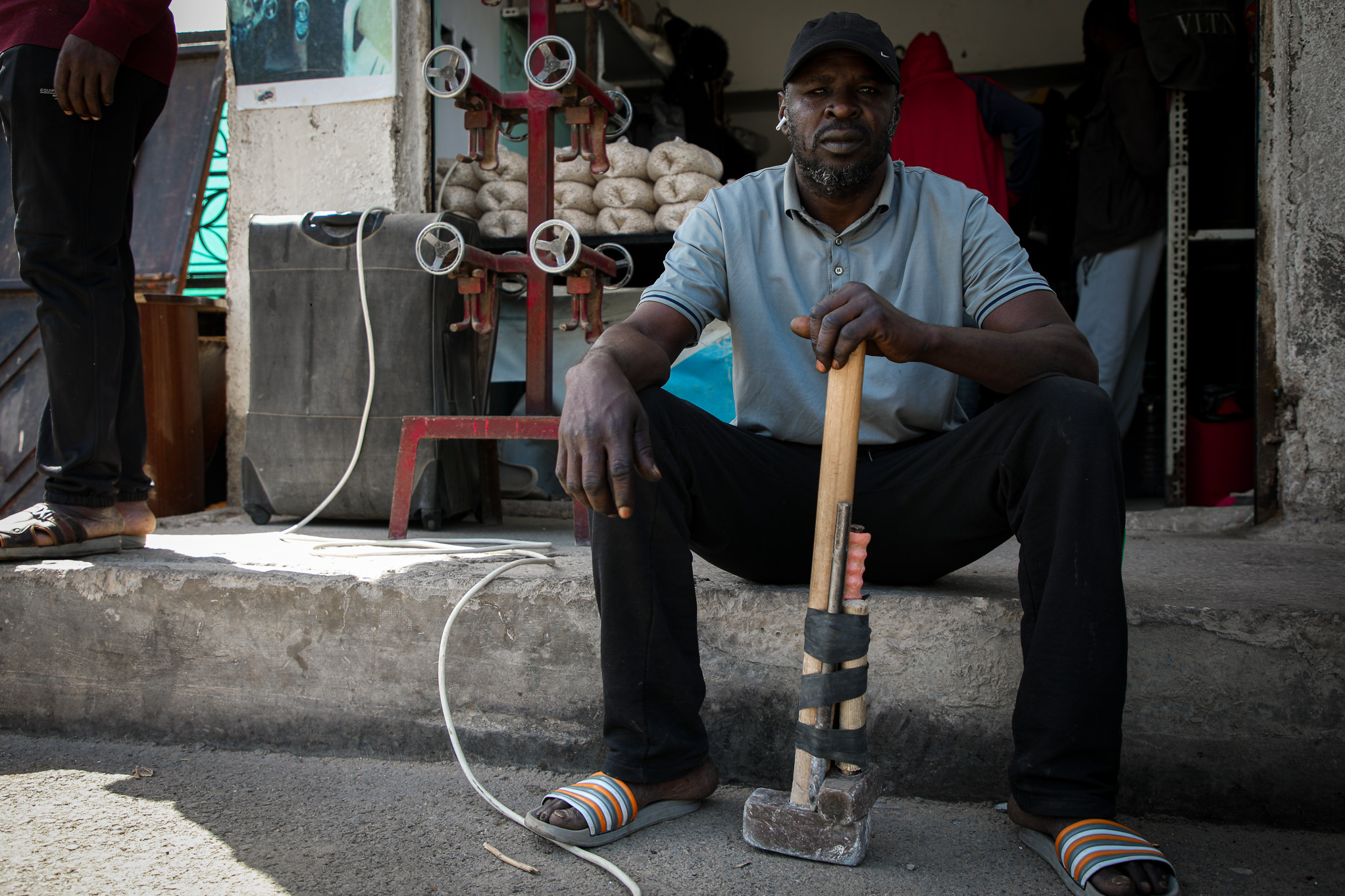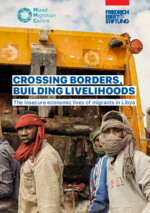Navigating hardships: Migrant economic realities in Libya

An interview with the author of a recent joint study "Crossing borders, building livelihoods" of the Mixed Migration Center in cooperation with the Friedrich-Ebert-Stiftung on the economic outlook for migrants in Libya.
Mr. Girault, Libya is an important transit country on the Central Mediterranean Route for migrants on their journey to Europe. What are the main reasons for people choosing Libya as a destination and where do most of the migrants come from?
Thibaut Girault: Libya has long been a popular destination and transit country for migrants seeking economic opportunities and attracted by competitive wages. Our study showed that economic factors overwhelmingly influence migrants’ decision to leave their country of origin (77% of them). This is particularly the case for migrants from neighboring countries such as Egypt, Niger, Chad, and Sudan, who account for three-quarters of migrants in Libya. They settle in Libya to gain access to better economic opportunities, participate in seasonal migratory flows, or work to save money and finance their onward journey. However, insecurity and violence in their country of departure also play a significant role (41%). Since the outbreak of the war in Sudan in April 2023, there has been a surge in the number of Sudanese refugees in Libya, reaching 33,481 in January 2024 registered by UNHCR.
What is the economic and political environment in Libya for migrants entering the country?
While economic opportunities remain a draw, political instability, the criminalization of migration, protection risks, human right violations and precarious working conditions in the informal labor market create vulnerabilities. According to IOM data, assistance needs among migrants in Libya are acute across all sectors, including health services, accommodation, non-food items, and water, sanitation, and hygiene. Since October 2021, the country has seen a spike in the arbitrary detention of migrants. An independent UN-led fact-finding mission for Libya reported numerous violations against migrants who were brought to detention centers between January 2021 and December 2022, where they were exposed to inhumane conditions, torture, forced expulsions, and enforced disappearances. Similarly, kidnapping practices are common in the broader context of human trafficking in Libya, as migrants are vulnerable to extortion by non-state actors.
What role do migrants and their contribution play in the Libya’s economy?
Migrant workers play a critical role in Libya's economy by filling gaps in sectors often overlooked by the local workforce, meeting a sustained demand for low-skilled labor. According to joint FES and MMC research, the sectors in which respondents reported working during their stay in Libya are predominantly hands-on jobs, such as working in a café or restaurant (47%), construction (34%), and domestic work (31%). They also act as consumers, stimulating the local economy through their spending. Furthermore, by sending money home, they support their families and contribute to development efforts in their countries of origin. Libyan authorities have lately recognized the need for migrants’ labor in the country and have been more open to discuss potential legalization of some status to support, for example, the construction sector.
What are the main challenges for migrants in Libya in terms of decent work, living conditions, exposure to human rights violations etc?
Although Libya offers quick access to the labor market, finding decent work can be challenging. Our research found that almost all respondents (82%) who earned money in Libya lacked a written work contract, leaving them unprotected against workplace risks, exploitation, and abuse. Informal work exposes them to wage theft (66%), verbal abuse (60%), a lack of job security (49%), physical abuse (42%), and limited social safety nets. 76% earned money through casual or occasional work, leading to unpredictable income. Consequently, only 20% of respondents were able to cover their needs in Libya, indicating that migrants’ economic aspirations when choosing Libya as a destination or transit country predominantly remain unmet.
Do women migrants face additional challenges?
In Libya's labor market, where women's employment remains taboo, there is less diversity in sectors available to women migrant job seekers. Our research found that the most common sectors of employment for women respondents were domestic work and work in a café/restaurant. As women migrant workers tend to work in less visible sectors, which increases risks of exploitation, they are also more affected by protection incidents such as forced labour, lack of payment, confiscation of documentation and gender-based violence. Nearly a third of women who earned money in Libya reported experiencing sexual exploitation or abuse in the workplace.
How do EU policies influence the lives of migrants in Libya?
EU migration policies have a complex and often harmful impact on migrants' lives in Libya. The EU focuses on containing irregular migration by restricting flows, increasing returns to countries of origin, and outsourcing border management. Human rights concerns for migrants in Libya have been strongly condemned by the UN. Still, the EU's short-term containment strategy continues to fail in addressing migrants' protection and assistance needs. In parallel, the lack of investment in legal migration channels increases the demand for smuggling networks, perpetuating irregular migration.
What can be done to improve the livelihood and protection of migrants, especially the women, in Libya?
Our research provides avenues to foster a more secure and formal environment for migrants in Libya. Libyan authorities can lead a dialogue aiming to acknowledge the value of migrants and improve job market safety. Bilateral agreements with migrant origin countries can establish pathways for formal employment and social security access. Inclusion of migrant communities in governance discussions are crucial, alongside the private sector's contribution by promoting safe working environments and facilitating work permits. Foreign donors should maintain a focus on protection efforts for migrants, while humanitarian organizations provide mental health support and improve migrants’ access to information on application processes for work permits. To improve access to migrant workers facing high levels of vulnerability, particularly women working in the domestic labor sector, options such as working with migrant community leaders and intermediaries, and/or developing mobile units should be considered.

Girault, Thibaut
Crossing borders, building livelihoods
LaMarsa, 2024
Download (PDF) (5,5 MB PDF-File)
About

As MMC WANA Regional Research Coordinator, Thibaut Girault's role is to promote high-impact research that informs migration policy and programming in West and North Africa. With a diverse background combining project and research management, he has experience working with both international NGOs and UN agencies. In each context in which he has worked (Senegal, Tunisia, Jordan, Central African Republic, Rwanda, Lebanon and others), he has been committed to building an evidence-based, nuanced and shared understanding of sensitive issues such as mixed migration, social cohesion, violent extremism, and conflict.
The opinions and statements of the guest author expressed in the article do not necessarily reflect the position of the Friedrich-Ebert-Stiftung.





